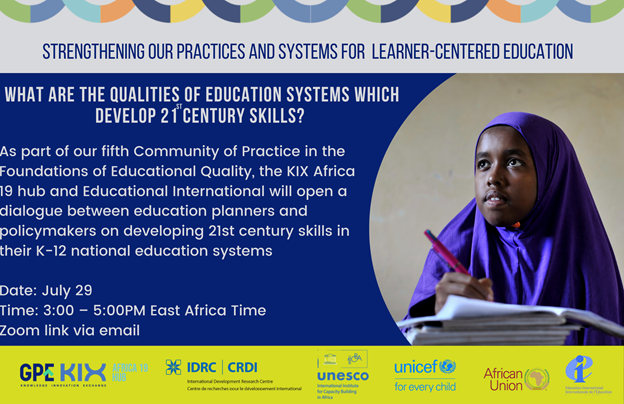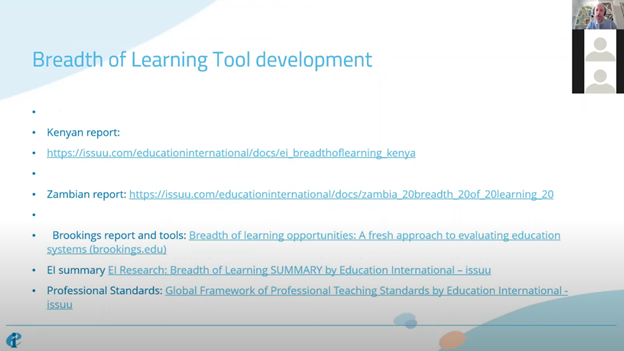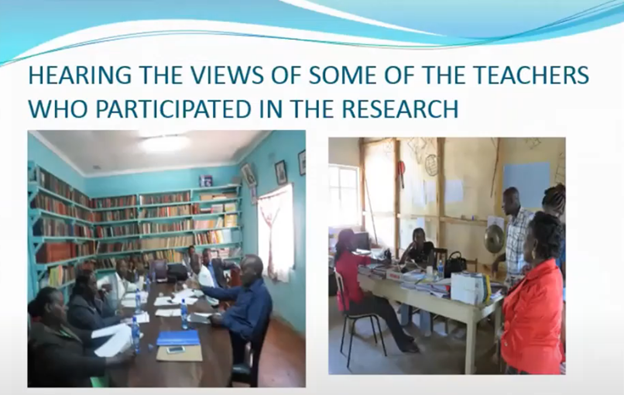
Education International (EI) and the KIX Africa 19 Hub spearheaded an interactive workshop on teaching, learning, and assessing 21st Century skills for the members of the Community of Practice (CoP) on the Foundations of Educational Quality. The workshop was attended by 52 curriculum officers, education planners, and stakeholders from the 18 countries of the KIX Africa 19 Hub and featured presentations, breakout room activities, and plenary discussions.
Defining 21st Century skills, William Kapambwe of the Zambia Examination Council said the “skills are represented by the 5 Cs: 1. Creativity 2. Critical thinking 3. Collaboration 4. Communication and 5. Curiosity”. Other participant conceptualizations included, “peace education, innovation, leadership, teamwork”. Attendees agreed that building 21st Century skills were important with Leah Msukwa of the Malawi Ministry of Education, Science and Technology noting its significance for “prospective workforces.”
EI researchers Martin Henry and Pedi Anawi incorporated Breadth of Learning Opportunities (BOLO) policy tools in the session to spark introspection into country partner education systems. BOLO tools can help assess the inputs and processes that align policies and practices to develop 21st Century skills in education systems.
EI’s Martin Henry sharing information on BOLO tool development

Jedidiah Rutere of the Kenya National Union of Teachers (KNUT) shared an assessment of BOLO in public secondary schools in Kenya. She noted that “18.8% [of teachers] spend 1-3 hours on life skills in a week” and that “only 21.9% of schools spend 1-2 hours on a weekly basis” on health education and emotional well-being.
KNUT’s recommendations to the Kenyan MoE included adjusting teacher education at higher education institutions to “offer subjects…[that] enhance teachers’ skills development” to correspond with 21st Century skills and the goals of education. In subsequent discussions on KIX’s online platform, Lola Silungwe of the Zambian Ministry of General Education stated that “We can ensure that the BOLO actually happens in school by incorporating all stakeholders in the implementation process”.
KNUT’s Jedidiah Rutere shares teacher engagement during an assessment of BOLO in Kenya

Ms. Silungwe also remarked that Zambia is “trying to improve teacher performance” and that the Ministry would “benefit from…[KIX’s] webinars and community of practice forums.” She also proposed future areas of knowledge and innovation exchange by exploring ways “to motivate teachers to shift their focus from only getting a qualification to looking at what the benefits of their training would be to the learner as well.”
The fifth workshop is a part of the recently completed six-part CoP on the Foundations of Educational Qualities. To watch the full recording of the workshop, click here.
To find out more about the CoP, check out summaries for the first, second, third, fourth, and sixth workshops.
To learn more about the KIX Africa 19 Hub, follow their activities on Facebook and Twitter and stop by its digital repository.
For questions or comments about this article, please contact kixafrica19hub@gmail.com.
